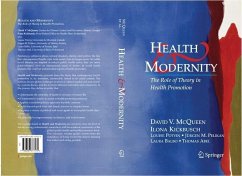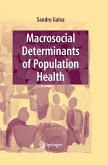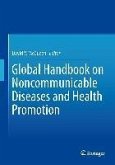The Role of Theory in Health Promotion
David V. McQueen, Centers for Disease Control and Prevention, Atlanta, Georgia
Ilona Kickbusch, Federal Office for Health, Bern, Switzerland
and
Louise Potvin, Université de Montréal, Canada
Jürgen Pelikan, University of Vienna, Austria
Laura Balbo, University of Ferrara, Italy
Thomas Abel, University of Bern, Switzerland
Pandemics, substance abuse, natural disasters, obesity, and warfare: the line that once separated health crisis from social crisis no longer exists. Yet while social theories are implied in today's public health arena, they are rarely acknowledged. Now an international panel of leaders in world health explores this vital but understudied aspect of health promotion.
Health and Modernity proceeds from the thesis that contemporary health promotion is, by definition, inextricably linked to its social context. The authors discuss global challenges in terms of cultural capital, risk and causality, systems theory, and the dynamic between individual and community. In the process, they define an entity that:
-Understands the centrality of health to all areas of human life
-Is committed to equity in access to health-promoting resources
-Applies a multidisciplinary approach to public concerns
-Looks beyond quick fixes and simple answers to complex issues
-Employs a variety of political and social agents to accomplish health objectives
-Is dedicated to empowerment, facilitation, and inclusiveness
The insights found in Health and Modernity are certain to raise the level of debate among professionals, researchers, and theacademic community in the global/public health and health promotion fields. This visionary volume guides readers from the immediacy of doing toward the deeper meaning that makes such doing possible.
Dieser Download kann aus rechtlichen Gründen nur mit Rechnungsadresse in A, B, BG, CY, CZ, D, DK, EW, E, FIN, F, GR, HR, H, IRL, I, LT, L, LR, M, NL, PL, P, R, S, SLO, SK ausgeliefert werden.
Hinweis: Dieser Artikel kann nur an eine deutsche Lieferadresse ausgeliefert werden.









